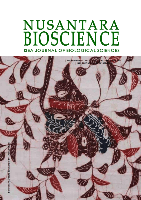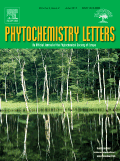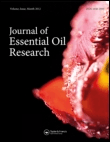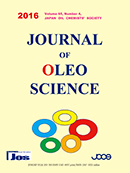
PHYTOCHEMISTRY REVIEWS
Scope & Guideline
Exploring the Depths of Plant Chemistry
Introduction
Aims and Scopes
- Phytochemical Analysis:
The journal emphasizes detailed studies on the chemical composition of plants, including the identification and characterization of bioactive compounds. - Biological Activity and Pharmacology:
Research articles often explore the pharmacological properties of phytochemicals, assessing their potential therapeutic effects against various diseases. - Traditional Medicine and Ethnopharmacology:
The journal frequently publishes reviews on the traditional uses of plants, linking historical knowledge with modern scientific findings. - Extraction and Purification Techniques:
Innovative methodologies for the extraction and purification of phytochemicals are a core focus, highlighting advancements in both conventional and novel technologies. - Sustainable Practices and Environmental Impact:
The journal encourages research on sustainable extraction methods and the ecological implications of phytochemical production and utilization. - Food and Nutraceutical Applications:
Papers often discuss the role of phytochemicals in nutrition, their potential health benefits, and their applications in food science. - Plant-Microbe Interactions:
Understanding the interactions between plants and their microbial environments, especially regarding phytochemical production and bioactivity, is a recurring theme.
Trending and Emerging
- Nanotechnology in Phytochemistry:
There is a growing interest in the use of nanotechnology for the delivery and enhancement of phytochemicals, particularly in drug development and therapeutic applications. - Phytochemicals in Disease Prevention:
Recent publications increasingly focus on the role of phytochemicals in preventing chronic diseases, such as cancer and diabetes, highlighting their potential as functional foods. - Integrative Approaches Combining Traditional and Modern Science:
Research that merges traditional knowledge with modern scientific approaches is on the rise, particularly in exploring the biomedical applications of traditional plants. - Microbial and Plant Interactions:
Emerging studies examine the role of microbial interactions in enhancing phytochemical production, indicating a trend towards understanding plant-microbe synergies. - Bioinformatics and Computational Approaches:
The application of bioinformatics and computational methods in studying phytochemicals and their interactions is gaining momentum, facilitating deeper insights into their mechanisms of action. - Sustainable and Green Extraction Techniques:
There is an increasing emphasis on sustainable practices in the extraction and processing of phytochemicals, aligning with global trends towards environmental sustainability.
Declining or Waning
- Traditional Uses of Lesser-Known Species:
There has been a noticeable decrease in papers focusing solely on the traditional uses of less-studied plant species, possibly as researchers shift towards more widely recognized or commercially viable plants. - Basic Phytochemistry without Application:
Research that focuses solely on the basic chemical analysis of phytochemicals without linking them to practical applications or biological activities is becoming less prominent. - Phytochemistry of Non-Medicinal Plants:
There is a waning interest in exploring the phytochemistry of plants that do not have recognized medicinal properties, as the emphasis shifts towards those with clear health benefits. - Chemical Diversity Studies:
While still relevant, studies that focus exclusively on the chemical diversity of phytochemicals without addressing their biological implications are less frequently published.
Similar Journals

Nusantara Bioscience
Pioneering Research for a Healthier TomorrowNusantara Bioscience is a prominent open-access journal dedicated to the field of biosciences, published by the Masters Program in Public Health at UNIV SEBELAS MARET in Surakarta, Indonesia. Since its inception in 2009, this journal has made significant contributions to the global discourse on biological sciences, environmental health, and public health research, providing researchers and professionals with an essential platform for sharing their findings. The journal, which holds an ISSN of 2087-3948 and an E-ISSN of 2087-3956, is committed to maintaining high academic standards while ensuring accessibility to quality research outcomes. Nusantara Bioscience enables a diverse audience, from students to seasoned researchers, to disseminate impactful studies and advance knowledge in the biosciences, reflecting the evolving challenges and innovations within the field.

Phytochemistry Letters
Advancing plant science through rigorous research.Phytochemistry Letters, an esteemed journal published by ELSEVIER, serves as a significant platform for the dissemination of cutting-edge research in the fields of agronomy, biotechnology, and plant science. With an ISSN of 1874-3900 and an E-ISSN of 1876-7486, this journal is recognized for its rigorous peer-review process and commitment to scientific excellence. Currently ranked in the Q3 quartile in Agronomy and Crop Science and Plant Science, and Q4 in Biochemistry, Phytochemistry Letters encompasses a wide range of topics critical to understanding the biochemical processes in plant systems. Researchers will find valuable insights that bridge the gaps between plant biochemistry and agricultural application, fostering innovation and sustainability. Given its solid position in Scopus rankings, particularly in Plant Science and Agronomy, the journal offers both open access and subscription options, ensuring wider reach and impact of published studies. The journal's ongoing contributions are vital for advancing knowledge and addressing contemporary challenges in phytochemistry, making it an indispensable resource for scholars, professionals, and students alike.

JOURNAL OF ESSENTIAL OIL RESEARCH
Innovating Applications of Essential OilsThe Journal of Essential Oil Research, published by Taylor & Francis Inc, is a premier academic journal dedicated to the field of essential oils, encompassing their chemistry, applications, and therapeutic benefits. With an ISSN of 1041-2905 and an E-ISSN of 2163-8152, this journal has become a vital resource for researchers and professionals seeking to advance their knowledge in this niche yet significant area of study. Spanning from 1989 to 2024, the journal maintains a strong reputation, currently positioned in the Q2 quartile for Chemistry (miscellaneous) and achieving a Scopus rank of #116 out of 408, placing it within the 71st percentile of its category. Although not an open-access journal, it provides rigorous peer-reviewed articles that contribute valuable insights into the rapidly evolving field of essential oils. Its objectives include advancing scientific understanding and application of essential oils in various sectors, including food, health, and cosmetics, making it a crucial platform for scholars, researchers, and practitioners alike.

Journal of Oleo Science
Advancing Oleochemical Innovation for a Sustainable FutureJournal of Oleo Science, published by the Japan Oil Chemists Society, stands as a pivotal resource in the domains of chemical engineering, chemistry, and medicinal applications, with a robust commitment to advancing knowledge in oleochemical research and technology. With an ISSN of 1345-8957 and an E-ISSN of 1347-3352, this open-access journal has been accessible to a global audience since 2021, facilitating the dissemination of high-quality scholarly articles and fostering collaboration among researchers. The journal, which has converged its publication scope from 2001 to 2024, currently holds a respectable Q3 ranking across multiple categories, reflecting its impact in the academic sphere. With Scopus ranks highlighting its position in general chemistry and chemical engineering, the Journal of Oleo Science not only serves as an essential platform for the latest developments in oleo science but also encourages the exploration of innovative approaches to tackling industry challenges. Articles submitted to the journal are subjected to rigorous peer review, ensuring that only the most significant and scholarly work is presented. By championing diverse perspectives and research findings, this journal is an invaluable asset for students, professionals, and academics dedicated to advancing the fields of oleochemistry and beyond.

CHEMISTRY OF NATURAL COMPOUNDS
Bridging Natural Products and Modern ScienceChemistry of Natural Compounds is a premier academic journal dedicated to the intersection of natural products and modern chemistry, published by Springer. Since its inception in 1965, this journal has published innovative research articles, reviews, and discussions that focus on the chemistry and biochemistry of natural compounds, with an emphasis on their applications in various fields including medicine, agriculture, and environmental science. Recognized for its contributions to the scientific community, the journal is indexed in key databases and holds a respectable impact factor that underscores its relevance in the academic landscape. Currently ranked in the Q3 category across multiple disciplines, including Biochemistry, Genetics and Molecular Biology, Chemistry, and Plant Science, it serves as a critical resource for researchers and professionals aiming to deepen their understanding of the complex interactions between natural compounds and biological systems. While not an open-access journal, Chemistry of Natural Compounds provides valuable insights and essential findings that can aid in advancing both theoretical and applied sciences for researchers, students, and industry practitioners alike.

Records of Natural Products
Illuminating the Path to Sustainable Pharmaceutical SolutionsRecords of Natural Products is a distinguished journal focused on the dynamic fields of Drug Discovery, Organic Chemistry, Pharmacology, and Plant Science. Published by ACG PUBLICATIONS in Turkey, this journal serves as a vital platform for disseminating innovative research findings and advancements in natural product studies. With its convergence spanning from 2009 to 2024, Records of Natural Products holds a commendable position in the academic realm, featuring a 2023 Q3 ranking in Drug Discovery and Organic Chemistry, alongside a notable Q2 ranking in Plant Science. Despite its current lack of open access, the journal is committed to providing quality content that enriches the understanding of natural products and their potential applications. Researchers and professionals alike can benefit from the journal's insights, which not only contribute to scientific knowledge but also facilitate advancements in pharmaceuticals and sustainable practices. By exploring the rich tapestry of natural product research, this journal underscores its importance as a leading resource for professionals dedicated to enhancing the efficacy and application of natural compounds.

Food Chemistry-X
Advancing the Science of Flavor and Safety.Food Chemistry-X is a premier open-access journal published by Elsevier, dedicated to advancing the field of food chemistry through high-quality research and comprehensive reviews. With its ISSN of 2590-1575, the journal has gained significant attention since adopting an open-access model in 2019, allowing wide dissemination of knowledge and innovations in food science. Based in the United Kingdom, it holds prestigious Q1 rankings in both Analytical Chemistry and Food Science categories as of 2023, positioning itself as a leading platform for researchers worldwide. The journal's focus spans extensive topics within food chemistry, including food safety, nutritional analysis, and the chemical properties of food, offering insights that are crucial for addressing contemporary challenges in food production and consumption. With a Scopus rank placing it in the 65th percentile among the top journals in Food Science and the 58th percentile in Analytical Chemistry, Food Chemistry-X is an essential resource for academics, professionals, and students seeking to stay at the forefront of research and innovation in this vibrant field.

Jundishapur Journal of Natural Pharmaceutical Products
Championing Quality Research for a Healthier TomorrowJundishapur Journal of Natural Pharmaceutical Products, published by BRIEFLAND in the Netherlands, serves as a pivotal platform for researchers and professionals in the realm of pharmacology and toxicology. With its ISSN 1735-7780 and E-ISSN 2228-7876, the journal has established itself since its inception in 2011, showcasing a commitment to advancing knowledge in natural pharmaceutical products through innovative research. In 2023, it earned a commendable ranking in the Q3 category for Pharmacology, Toxicology, and Pharmaceutics, reflecting its contribution to the field as evidenced by its position in the Scopus rankings. The journal aims to publish high-quality research articles, reviews, and case studies that explore the potential benefits and toxicological aspects of natural products. Although it currently does not offer open access, its rigorous peer-review process ensures that only impactful studies are disseminated, ultimately facilitating a deeper understanding of natural pharmaceutical innovations. For those engaged in this exciting and evolving field, Jundishapur Journal of Natural Pharmaceutical Products is an essential resource that not only expands scholarly discourse but also promotes safe practices in natural product utilization.

Rivista Italiana delle Sostanze Grasse
Catalyzing Insights into Organic ChemistryRivista Italiana delle Sostanze Grasse is a prominent journal in the field of Organic Chemistry, published by INNOVHUB SSI-AREA SSOG in Italy. With an ISSN of 0035-6808, this journal serves as a crucial platform for disseminating cutting-edge research and innovation related to fatty substances and their applications in various industries. Though its impact factor is yet to be established, it holds a notable position in the 2023 Scopus Rankings, being categorized in the Q4 quartile for Organic Chemistry, ranking #197 out of 211 journals in this field. The journal's converged years span from 2006 to 2024, showcasing a commitment to ongoing scholarly discourse. Researchers, professionals, and students alike value this journal for its rich contributions to understanding the chemistry behind oils and fats, and the latest advancements in substances relevant to food science, pharmaceuticals, and sustainable practices. While the journal is not currently open access, it is a critical resource for those seeking to expand their knowledge on the intricate roles of organic compounds in various applications.

Annals of Phytomedicine-An International Journal
Advancing Knowledge in Herbal MedicineAnnals of Phytomedicine - An International Journal is a leading publication dedicated to the exploration and advancement of phytomedicine, broadly encompassing research on medicinal plants, their bioactive compounds, and therapeutic applications. Published by UKAAZ Publications, this journal seeks to bridge the gap between traditional and modern medicinal practices, offering a platform for researchers, professionals, and students passionate about herbal therapies and their efficacy. With an ISSN 2393-9885 and E-ISSN 2278-9839, the journal adheres to stringent peer-review protocols to ensure the publication of high-quality research. Fostering open access to knowledge in a rapidly evolving field, Annals of Phytomedicine serves as an essential resource, promoting innovative findings and comprehensive reviews that drive the global discourse on phytotherapy. By engaging with this journal, readers can stay informed about the latest advancements, contributing significantly to the scholarly community and beyond.